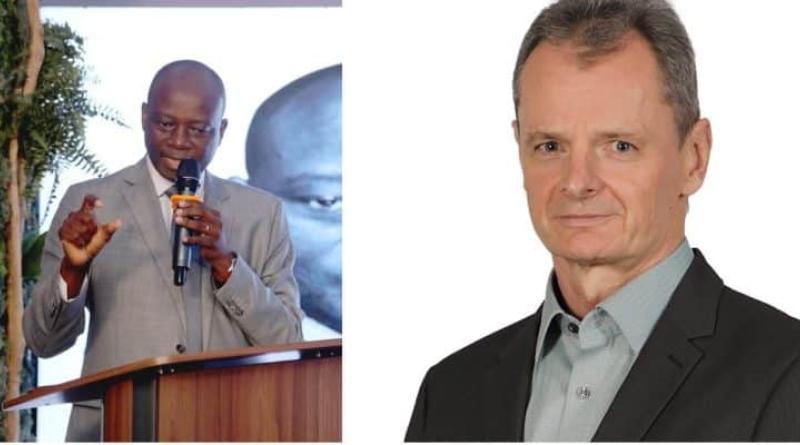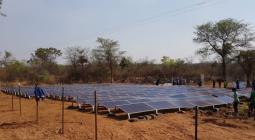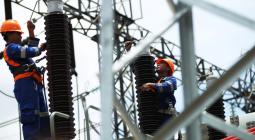In terms of access to electricity, the difficulties are immense in Africa, especially access to financing. This issue was at the heart of the Energy Access Investment Forum (EAIF) which has just ended in Abidjan, Ivory Coast. On the sidelines of this event, AFRIK 21 spoke with two Schneider Electric officials: Albert Fuchet, the Vice President in charge of energy access, and Emile Parfait Mouloundou, the General Manager for Francophone Africa.
Jean Marie Takouleu (AFRIK21) : Schneider Electric took part in the EAIF 2023 which has just ended in Abidjan, Ivory Coast. Several events like this one have multiplied in recent years in Africa. And yet, the situation on the continent has changed little in terms of access to electricity. What justifies Schneider Electric’s presence at EAIF 2023?
Albert Fuchet (AF) : The stakes are high. It is estimated that 600 million Africans do not have access to electricity, even though it is the basis of life. Without electricity in the 21st century, we can no longer do much in terms of education, security, food, communication, etc. So it is an extremely important issue. So it’s an extremely important issue. In addition, access to electricity is at the heart of Schneider Electric’s value proposition.
It’s a company that specializes in the digital economy oriented towards energy efficiency and sustainability, meaning that it has contributed to limiting global warming. Being an impact company, Schneider is one of the most active large groups for access to energy, with a specific division that I have the honor to lead. Our goal is to connect 50 million people to electricity by 2025, 200 million people by 2030. All this while following our sustainability objectives.
I should also mention the quality of the event. The EAIF is the main event dedicated to financing electricity access in Africa. We were there last year in Dar es Salaam, Tanzania, where we were able to interact with different ecosystems, including representatives from across the African continent. That’s why we made it the main events for electricity access in Africa.
AFRIK 21: Schneider representatives participated in several panels on financing access to electricity at EAIF 2023. In concrete terms, how is Schneider Electric contributing to the electrification of Africa?
Émile Parfait Mouloundou (EPM): We are strongly committed to access to electricity in Africa, through research and the implementation of innovations. Schneider Electric makes affordable equipment available to populations in need, taking into account their situation. We also contribute to the electrification of Africa through the training of young people and women, and support entrepreneurship.
Very concretely, if you are for example in the periphery of a locality like Bamenda in Cameroon where there is no electricity yet, you will have to set up sustainable systems of electricity production. The trainings aim at creating revenue generating activities around the system so that local entrepreneurs can produce wealth to finance the maintenance of the electricity access solution. So, we train entrepreneurs with the vision of developing the community.
Schneider Electric also supports electrification through the provision of financing via investment funds such as E3 Capital (formerly Energy Access Ventures) based in Nairobi, Kenya, which finances electricity access providers.
AFRIK 21: On the sidelines of EAIF 2023, Schneider Electric has partnered with Gaia Impact, Investisseurs & Partenaires, Capelan and Capital Croissance to launch the Gaia Energy Impact Fund II (GEIF II). Schneider Electric is contributing €15 million to the fund. What is the purpose of this new initiative?
AF : This is the fourth fund we have launched. GEIF II is a catalyst that aims to accelerate innovation in access to electricity, particularly around digital. Digital transformation now makes it possible, with the Internet of Things (IoT), to reduce the operating costs of mini-grids installed at remote sites. With Gaia and the other partners, we are a coalition of experts who hope to attract other investors. The goal is to reach a capitalization of 80 million euros. The fund will support entrepreneurs with high environmental and social impact. We hope that GEIF II will contribute to electrifying as many villages as possible in Africa and elsewhere.
AFRIK 21: At the very first EAIF 2023 panel, an energy professional from Senegal asked a question that reflects the current trend in Africa. Africans want to consume local products, and this affects all sectors, including energy. Could the fact that the GEIF II fund will finance seed-stage companies help address this concern by supporting local entrepreneurship?
EPM: The actions that are carried out by funds like GEIF II are also dedicated to local partners. Schneider has a knowledge transfer policy on manufacturing and operations. The question also concerns the local manufacture of equipment that comes from India and China, even though the ecosystems are more or less the same. This is something to think about. But we have to understand that setting up a manufacturing unit in countries costs much more, and we need a market and government support.
What we see, and this is not necessarily a criticism, is still empty words at the level of our governments when they say “we will support the electrification policy”. Otherwise, there are countries that stand out like Ivory Coast, where there is a real electrification policy. Moreover, there is still no policy to protect local production. So the solution is a little more political. Otherwise, Schneider has co-financed factories in Algeria and Morocco.
AFRIK 21: So, Sub-Saharan Africa is not yet ready?
EPM: It is all a question of political will.
AFRIK 21: Schneider Electric has developed electrification solutions that you presented at the EAIF. These include Homaya Hybrid, Homaya Pro and EcoStruxure Energy Access Expert. Are they already operational somewhere in Africa?
AF : These solutions start with the smallest products, including solar lanterns that are used in emergency situations. We have distributed them in refugee camps. There are also solar home systems that are already installed in Africa and Asia. It is very effective for electrifying businesses, health centers, community centers, etc. The EcoStruxure Energy Access Expert solution interconnects electrical infrastructure on a cloud-based platform, enabling remote analysis and decision-making.
We have provided decentralized electricity access solutions for United Nations (UN) missions in Chad and the Central African Republic (CAR). And recently, Schneider signed a partnership with Equity Bank in the Democratic Republic of Congo (DRC) to accelerate the electrification of all its provinces.
AFRIK 21: Beyond the lack of financing, the cost of equipment is also cited as one of the obstacles to electrification in Africa. Some electricity providers are proposing to zero-rate equipment dedicated to electrification. Senegal has already done so. What is your opinion on this issue?
EPM: This is a key issue. As a manufacturer, I would recommend that the country explore this option so that the equipment can be distributed to the population at even better prices. For example, a kit leaves the factory in China around 25 and 30 euros. Upon arrival in Africa, several costs apply, including travel and various taxes. And the merchant on site must be able to add his margin. Finally, the product can be found on the Cameroonian market at 50,000 CFA francs (more than 76 euros, ed. note).
But our economies are fragile, with all the sectors that are ultimately priorities. Not all countries have the same economic fabric. There are economies where it could work very well, and situations where this solution would be less appropriate.
AFRIK 21: What do you think Albert Fuchet?
AF : There are many examples where the provision of decentralized renewable electricity in the regions creates value through the multiplication of agricultural production, the reduction of health problems, the training of young people, etc. So, the overall result that we could have through the reduction of taxes by an increase in volume in my opinion is positive. But it is a decision of the different countries.
Interview by Jean Marie Takouleu






